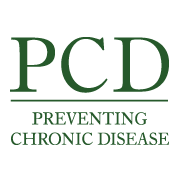PCD News Summary for February 2, 2017

About the Journal
Published every Thursday, Preventing Chronic Disease (PCD) is a peer-reviewed online journal established by CDC’s National Center for Chronic Disease Prevention and Health Promotion. The News Media Branch prepares press summary packets each week. To receive these press summaries on an embargoed basis, send an e-mail to media@cdc.gov. Please note that this e-mail list is for credentialed journalists only. All others, please visit Hookup to Health to sign up for e-mail updates
Notice to News Media – PCD Release Time and Embargo Policy:
CDC’s News Media Branch releases to reporters the PCD media packet every Tuesday afternoon between 12 and 2 pm.
Embargoed until Thursday, February 2, at 12:00 PM ET
Shared Use of Physical Activity Facilities Among North Carolina Faith Communities, 2013
Melissa Newton
mnewton@cdc.gov
404-718-6281
A study of North Carolina faith communities showed that many are opening up their spaces for shared use, including physical activity, which could encourage public health practitioners to expand or enhance faith community partnerships. In 2013, North Carolina State University, the North Carolina Division of Public Health, and the North Carolina Council of Churches collaborated to assess whether faith communities were opening up their spaces to allow the surrounding community to use them for physical activity. This study, the first to look at shared use among faith communities, showed that nearly 83 percent of faith communities were opening up their spaces for shared use, including physical activity. Faith communities in the wealthiest counties were more likely to share their spaces than were those in poorer counties. The most common barriers to shared use included faith communities not knowing how to initiate the process of sharing their facilities and outside groups not initiating conversations about sharing with faith communities.
A Home-Based Exercise Program Driven by Tablet Application and Mobility Monitoring for Frail Older Adults: Feasibility and Practical Implications
Melissa Newton
mnewton@cdc.gov
404-718-6281
Frail older adults provided with regular coaching and a stable Internet connection could benefit from home-based video exercise programs combined with a mobility-monitoring sensor. Community-dwelling older adults living in The Netherlands were recruited in 2014 to participate in an exercise study supported by a sensor and tablet application. Participants exercised three months with and three months without supervision from a remote coach. A necklace-worn sensor monitored adherence to video exercises. Participants received tailored feedback on their adherence and daily activity delivered automatically by the system. Adherence overall was 60.9 percent. Adherence to the home-based exercise program proved to be mostly dependent upon stability of the system and internet connectivity. This program shows promise for stimulating physical activity among older frail adults, especially if it offers regular coaching.
###
Note: Not all articles published in PCD represent work done at CDC. In your stories, please clarify whether a study was conducted by CDC (“a CDC study”) or by another institution (“a study published by CDC”). The opinions expressed by authors contributing to PCD do not necessarily reflect the opinions of CDC or the institutions with which the authors are affiliated. PCD requests that, when possible, you include a live link to the article in your stories.
###
U.S. DEPARTMENT OF HEALTH AND HUMAN SERVICES
CDC works 24/7 protecting America’s health, safety and security. Whether diseases start at home or abroad, are curable or preventable, chronic or acute, stem from human error or deliberate attack, CDC is committed to respond to America’s most pressing health challenges.